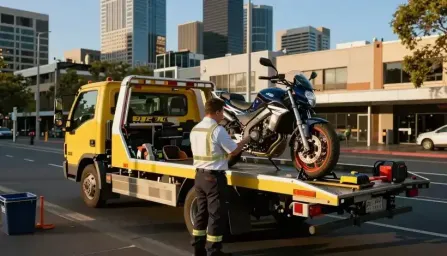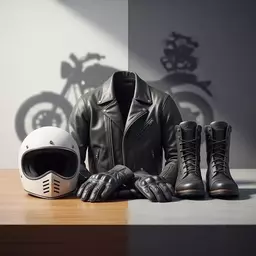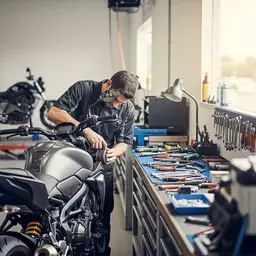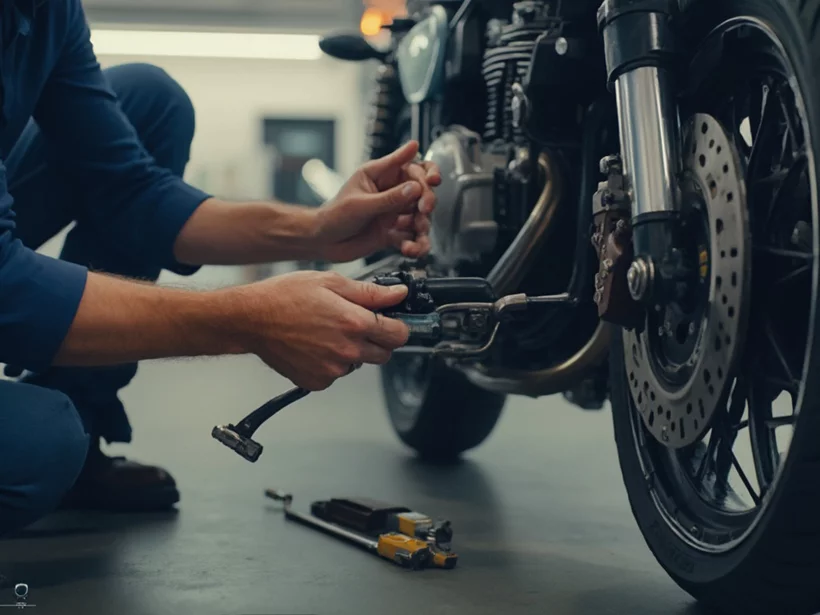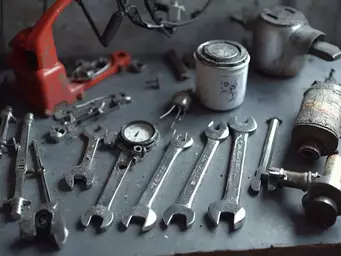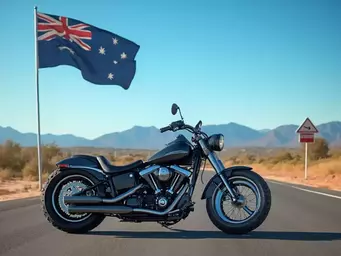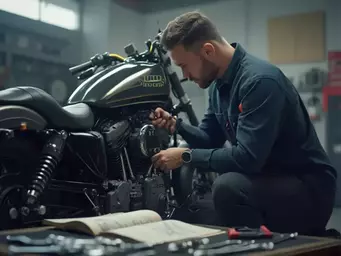Motorcycle Maintenance Troubleshooting Guide
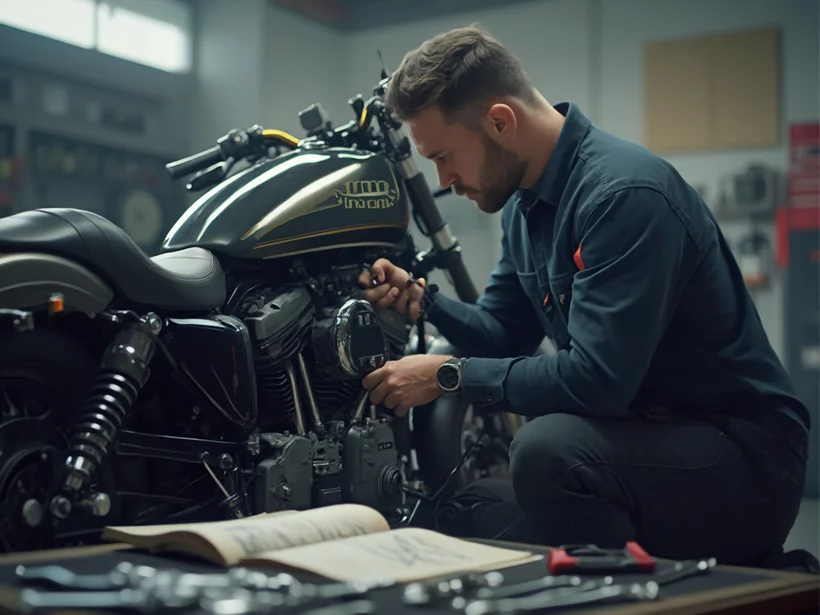
As riders, understanding the vital elements of motorcycle maintenance can dramatically enhance your experience and ensure your safety on the road. Have you ever found yourself confused about engine issues or electrical failures? Let’s simplify these complexities!
What You Will Learn
- Recognizing early symptoms of engine problems can prevent costly repairs.
- Regular maintenance reduces the likelihood of breakdowns during rides.
- Understanding your motorcycle's electrical system is crucial for troubleshooting.
- Creating a personalized maintenance checklist helps streamline your bike care routine.
- Engaging with the motorcycle community can provide valuable insights and support.
- Learning when to seek professional help ensures your safety and enhances bike performance.
Motorcycle Maintenance: Key Issues and Solutions
Understanding common motorcycle maintenance problems and how to address them can significantly improve your riding experience and safety. This visual breaks down engine and electrical issues, offering insights into symptoms and solutions.
Engine Problems: Symptoms & Causes
Engine Not Starting
- Empty fuel tank / fuel line issues
- Faulty battery / electrical connections
- Clogged fuel or air filters
Misfires & Performance Drops
- Worn spark plugs / ignition coils
- Fuel delivery problems
- Vacuum leaks
Overheating
- Low coolant levels
- Damaged radiator / blocked airflow
- Prompt component replacement
Electrical Issues: Troubleshooting Steps
Recognizing Faults
- Flickering lights / dim displays
- Unresponsive switches
- Battery draining quickly
Diagnostic Tools
- Multimeter for voltage, current, resistance
- Professional guidance if unsure
Common Fixes
- Check and replace blown fuses
- Inspect wiring for wear / corrosion
- Test battery charge and connections
Understanding Common Motorcycle Maintenance Issues
As motorcycle enthusiasts, we know that keeping our machines in top shape is essential for both safety and performance. At Motorbikes Australia, we often hear from riders facing various maintenance challenges. Understanding these common motorcycle maintenance issues can save you a lot of trouble down the road. Let’s dive into some key areas of focus!
Identifying Symptoms of Engine Problems
Engine troubles can be particularly daunting, but knowing the symptoms is the first step in addressing them. Common signs of engine problems include strange noises, stalling, or poor acceleration. Recognizing these early indicators can help you avoid serious damage and keep your riding experience enjoyable!
Common Causes of Engine Not Starting
- Empty fuel tank or fuel line issues
- Faulty battery or electrical connections
- Clogged fuel filters or air filters
If your bike refuses to start, the above causes are often the culprits. Checking the fuel and battery connections is a good first step before calling in the pros. For a deeper understanding of motorcycle systems, you might find this motorcycle technician study guide helpful in diagnosing complex issues.
Diagnosing Engine Misfires and Performance Drops
- Worn spark plugs or ignition coils
- Fuel delivery problems
- Vacuum leaks in the intake system
Experiencing a misfire? This can lead to frustrating drops in performance. Regular checks on your spark plugs and fuel system can prevent these issues from escalating!
Addressing Engine Overheating: Causes and Solutions
Overheating is a serious concern. Common causes include low coolant levels, a damaged radiator, or blocked airflow. To keep your bike running smoothly, regularly check coolant levels and ensure your radiator is clean and clear.
- Regularly inspect coolant levels
- Flush the radiator as needed
- Replace any damaged components promptly
Electrical System Troubleshooting
Next up is the electrical system. It's like the nervous system of your motorcycle—when it’s functioning well, everything runs smoothly. Let's explore how to troubleshoot common electrical issues.
Recognizing Electrical Faults in Motorcycles
- Flickering lights or dim displays
- Unresponsive switches
- Battery draining quickly
If you notice any of these signs, it's important to act quickly. Faulty electrical connections can lead to more severe issues if left unattended!
Using a Multimeter for Electrical Diagnostics
A multimeter is an essential tool for diagnosing electrical problems. It helps you measure voltage, current, and resistance, making it easier to pinpoint where the issue lies. If you’re not familiar with using a multimeter, don’t hesitate to reach out for guidance! Comprehensive resources like the Motorcycle Mentorship Program offer valuable insights into various aspects of maintenance, including electrical system checks.
Troubleshooting Common Electrical Issues: A Comprehensive Guide
- Check fuses and replace any that are blown
- Inspect wiring for signs of wear or corrosion
- Test the battery’s charge and connections
Tackling these common electrical issues can save you from a roadside breakdown, ensuring your rides remain uninterrupted!
Engage with Your Fellow Riders!
What motorcycle maintenance tips have you found most valuable? Share your insights and experiences with the community! Your contribution could help fellow riders tackle their maintenance challenges more effectively. Join the conversation below:
Frequently Asked Questions About Motorcycle Maintenance
What are the early signs of engine problems I should look out for?
Early signs of engine problems include strange noises (knocking, ticking), stalling, difficulty starting, and noticeable drops in performance or acceleration. Addressing these symptoms promptly can prevent more serious damage.
How often should I perform regular maintenance on my motorcycle?
The frequency of maintenance depends on your motorcycle model and how often you ride. Generally, it's recommended to follow your manufacturer's maintenance schedule. Key checks like tire pressure, oil levels, and lights should be done before every ride, while more in-depth checks (e.g., oil changes, spark plug inspection) are typically scheduled every few thousand kilometers or annually.
What tools are essential for basic electrical system troubleshooting?
A multimeter is an essential tool for basic electrical diagnostics. It allows you to measure voltage, current, and resistance to help pinpoint issues like a draining battery or faulty connections. Test lights and a basic set of wrenches and screwdrivers are also very useful.
When should I seek professional help instead of attempting a DIY repair?
You should seek professional help if you are unsure about the nature of a problem, lack the specialized tools required for a repair, or if the repair involves critical safety components like brakes or complex engine internals. Your safety is paramount, and a professional mechanic has the expertise and equipment to handle complex issues correctly.
How can engaging with the motorcycle community help me with maintenance?
Engaging with the motorcycle community through clubs, forums, or events provides a valuable network for sharing knowledge, tips, and troubleshooting advice. Experienced riders can offer practical solutions, recommend reliable mechanics, and even help you learn new maintenance skills. It's also a great way to stay motivated and informed about best practices.
Summarizing Key Takeaways on Motorcycle Maintenance
As we wrap up our exploration of motorcycle maintenance, it's vital to remember that knowledge is power! By understanding the common issues and maintenance techniques, you can become a more confident rider. Here are some key takeaways that can empower you in your motorbike journey:
- Regular maintenance prevents major issues down the road.
- Identifying problems early can save both time and money.
- Knowing when to seek professional help is crucial for safety.
- Engaging with the motorcycle community enhances your learning.
As an avid motorbike enthusiast, I can't stress enough how important it is to equip yourself with both the knowledge and skills to keep your ride in top shape. Whether you're tackling a simple oil change or troubleshooting a more complex issue, your confidence will grow with every step you take!
Empowering Yourself with Knowledge and Skills
When it comes to motorcycle maintenance, understanding your limits is key! Balancing DIY fixes with professional help can make all the difference. There's no shame in admitting when a task is beyond your comfort zone. After all, your safety is paramount!
- Assess your skills honestly before starting a repair.
- Learn from mistakes to enhance your capability.
- Utilize resources like maintenance guides for DIY projects.
Continuous learning in motorcycle care not only improves your skills but also keeps you engaged with your bike. I often find that the more I learn, the more I enjoy the riding experience. For example, the Motorcycle Resource Guide offers valuable information on various aspects of safe riding and maintenance. So, dive into books, watch how-to videos, or even take a workshop to hone your skills!
Next Steps for Maintaining Your Motorcycle
Now that you have a solid foundation, let's talk about the next steps. Creating a personal maintenance checklist is a fantastic way to stay organized and ensure that nothing slips through the cracks!
Creating a Personal Maintenance Checklist
Having a personalized maintenance checklist can streamline your motorcycle care routine. It helps ensure that you're consistently checking all the critical areas of your bike.
- Establish a timeline for routine inspections.
- Include items like oil changes, tire pressure checks, and brake assessments.
- Track when repairs or replacements are completed for future reference.
Printable guides and checklists can be a lifesaver, providing you with a visual reminder of what needs attention. It's like having a reliable riding buddy who keeps you on track!
Engaging With the Community for Shared Learning
One of the best parts of being a motorcyclist is the community that comes with it. Engaging with fellow riders can open up a wealth of knowledge and shared experiences that enhance your journey.
- Join local motorcycle clubs for group rides and tips.
- Participate in online forums to seek advice and share stories.
- Attend workshops or events to learn from experienced riders.
Whether you're sharing your adventures or seeking help with a maintenance issue, the motorcycle community is a fantastic resource. What’s your favorite riding memory? Don’t hesitate to share it! Together, we can inspire each other to become more informed and skilled riders!
Recap of Key Points
Here is a quick recap of the important points discussed in the article:
- Regular maintenance prevents major issues down the road.
- Identifying symptoms of engine problems can save time and avoid costly repairs.
- Understanding electrical system troubleshooting can help ensure a smooth riding experience.
- Create a personalized maintenance checklist to streamline your motorcycle care routine.
- Engaging with the motorcycle community enhances learning and riding enjoyment.
